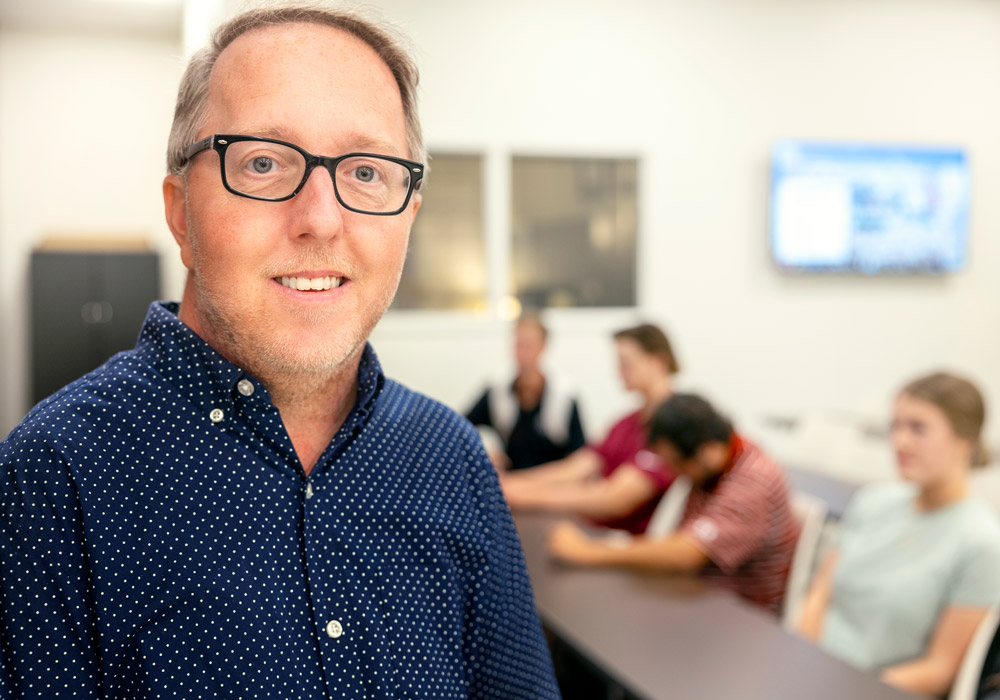John Grady’s path to being a sport management researcher and professor started in a not-so-typical place: law school.
While attending Florida State’s law school, he attended a guest lecture from a sport management professor working on trademark issues with team logos and other sports law issues. At the end of the presentation, she invited students to consider pursuing a Ph.D. under her mentorship after they earned their law degrees.
“It's hard to get people that want to stay after a J.D. They want to go be lawyers and make money. That’s the natural career path,” Grady says. “Law is a professional degree. You’re being trained to be a lawyer.”
But her suggestion made him think about his future. And he was intrigued. He decided to pivot and start on an academic and research path into sports law.
“I came into it through law, not through sports. It was a different career path than I had intended, honestly. But it really was finding the right mentor who can help shape your journey into a career. It was where my passion was. But I had to have someone else help me find it.”
And that’s exactly what he is now doing at USC, where this year he was chosen for the Carolina Trustees Professorship award, presented to faculty members who are committed to teaching excellence in any phase of the university's educational mission.
“I think research is one way that students can become engaged and find the spark to their major and to their learning. It's a different way of learning, learning through research."
As a professor in the College of Hospitality, Retail and Sport Management, Grady teaches sports law and risk management to undergraduates. At the graduate level, he teaches a doctoral seminar in sport and entertainment law and risk management. He excels as a classroom teacher and is a past winner of the Mungo Undergraduate Teaching Award.
Grady conducts extensive research about legal issues affecting the business of sport, especially around mega sport events like the Olympics. His work focuses on Olympic sponsorship and athlete endorsement, especially at it relates to social media use and the policy implications for athletes and sponsors of sport events. He also is heavily involved in mentoring students who perform undergraduate research and take part in experiential learning as part of their degree program.
“I think research is one way that students can become engaged and find the spark to their major and to their learning. It's a different way of learning, learning through research,” Grady says. “I see research as a path for them that they may not realize on their own. They might say, ‘Why would I want to do research as a sophomore in college?’ So we need to sell them the benefits.”
Those students have conducted research around the state, the country and internationally, accompanying Grady to the Olympic Games in places such as Rio and London. He pushes them to consider areas and topics that they find interesting and to conduct their own research.
"What has been remarkable about these students is they have used their own original research or experiences with our industry partners to propel them forward to early career success in the sport and entertainment industry,” he says.
Some of his sport and entertainment management students have gone on to careers with professional sports teams and major sport and entertainment venues, or with sport industry giants like Under Armour. Others have pursued law degrees and now work in firms specializing in sport and entertainment.
“With all of the changes happening in sports law right now, such as NIL rights for college athletes, it's an exciting time to be teaching about these topics and helping shape the discussion about how athletes can now assert their legal rights,” Grady says.
And in the 18 years he has spent at USC, he has seen the SPTE program grow in both size and quality of students.
“My advice to students is to get involved early and gain early experience in the industry. “The industry partners that we work with have responded and noticed. They say, ‘South Carolina students come to us so much better prepared and much sooner than others.’
